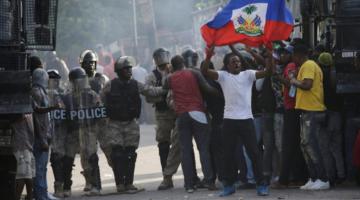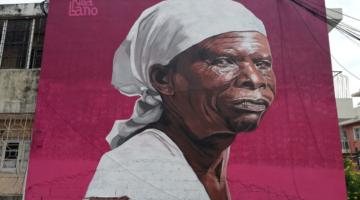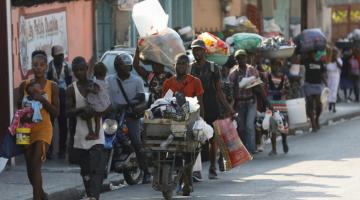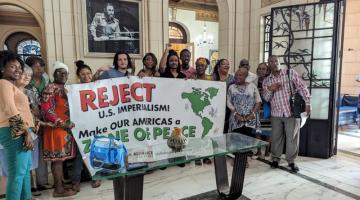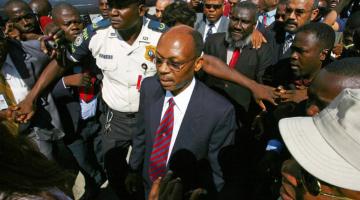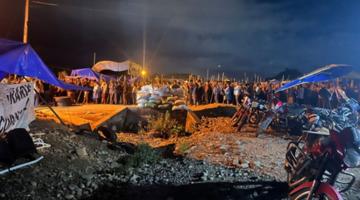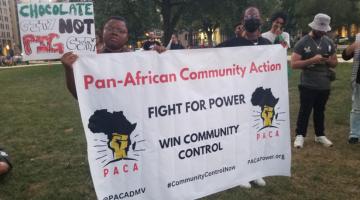Former Haitian President Jean Bertrand Aristide holding a press conference outside the White House in Washington, DC, after the coup in 1991.
The Black Alliance for Peace lays out the reality of the ongoing crisis in Haiti, rejecting the mainstream narrative of a crisis of "gangs".
Haiti is in the headlines again and, as usual, the headlines on Haiti are mostly negative. They are also largely false. Haiti, they tell us, is overrun by “gang violence.” Haiti is “a failed state,” standing on the verge of “anarchy” and teetering on the edge of “collapse.” Haiti, they tell us, can only be stabilized and saved through foreign military invasion and occupation. We have seen these stories before. We know their purpose. They serve to cover up the true origins of the “crisis” in Haiti while justifying foreign military intervention and setting up an attack on Haiti’s sovereignty.
What is the reality behind the headlines? The reality is that the crisis in Haiti is a crisis of imperialism. Those countries calling for military intervention – the US, France, Canada – have created the conditions making military intervention appear necessary and inevitable. The same countries calling for intervention are the same countries that will benefit from intervention, not the Haitian people. And for twenty years, those countries that cast Haiti as a failed state actively worked to destroy Haiti’s government while imposing foreign colonial rule.
On Haiti, the position of the Black Alliance for Peace has been consistent and clear. We reject the sensationalist headlines in the Western media with their racist assumptions that Haiti is ungovernable, and the Haitian people cannot govern themselves. We support the efforts of the Haitian people to assert their sovereignty and reclaim their country. We denounce the ongoing imperialist onslaught on Haiti and demand the removal of Haiti’s foreign, colonial rulers.
What’s Going on in Haiti?
● The crisis in Haiti is a crisis of imperialism – but what does this mean? It means that the failure of governance in Haiti is not something internal to Haiti, but it is
a result of the concerted effort on the part of the west to gut the Haitian state and destroy popular democracy in Haiti.
- Haiti is currently under occupation by the US/UN and Core Group, a self-appointed cabal of foreign entities who effectively rule this country.
- The occupation of Haiti began in 2004 with the US/France/Canada-sponsored coup d’état against Haiti’s democratically elected president. The coup d’etat was approved by the UN Security Council. It established an occupying military force (euphemistically called a “peacekeeping” mission), with the acronym
MINUSTAH. Though the MINUSTAH mission officially ended in 2017, the UN office in Haiti was reconstituted as BIHUH. BINUH, along with the Core Group, continues to have a powerful role in Haitian affairs.
- Over the past four years, the Haitian masses have mobilized and protested against an illegal government, imperial meddling, the removal of fuel subsidies leading to rising costs of living, and insecurity by elite-funded armed groups. However, these protests have been snuffed out by the US-installed puppet government.
- Since 2021, attempts to control Haiti by the US have intensified. In that year, Haiti’s president, Jovenel Moïse was assassinated and Ariel Henry was installed by the US and UN Core Group as the de facto prime minister. In the wake of the assassination of Moïse and the installation of Henry, the U.S. has sought to build a coalition of foreign states willing to send military forces to occupy Haiti, and to deal with Haiti’s ostensible “gang” problem.
- The armed groups (the so-called “gangs”) mainly in the capital city of Haiti should be understood as “paramilitary” forces, as they are made up of former (and current) Haitian police and military elements. These paramilitary forces are known to work for some of Haiti’s elite, including, some say, Ariel Henry (Haiti’s former de facto prime minister). It should also be noted that Haiti does not manufacture guns; the guns and ammunition come primarily from the US and the Dominican Republic; and the US has consistently rejected calls for an arms embargo.
- Moreover, as Haitian organizations have demonstrated, it is the UN and Core Group occupation that has enabled the “gangsterization” of the country. When we speak of “gangs,” we must recognize that the real and most powerful gangs in the country are the US, the Core Group, and the illegal UN office in Haiti – all of whom helped to create the current crisis.
- Most recently, Ariel Henry traveled to Kenya to sign an agreement with Kenya prime minister William Ruto authorizing the deployment of 1,000 Kenyan police officers as the head of a multinational military force whose ostensible purpose was to combat Haiti’s gang violence. But the US strategy for Haiti appears to have collapsed as Henry has been unable to return to Haiti and there is renewed challenge to the constitutionality of that deployment.
- The US is now scrambling for control, seeking to force Henry’s resignation while looking for a new puppet to serve as a figurehead for foreign rule of Haiti. While Haiti currently does not have a government, it has not descended into chaos or anarchy. The paramilitaries, it seems, are waiting for their orders to act, while the US strategy for Haiti is in crisis.
Why Haiti?
For BAP, the historic struggles of the Haitian people to combat slavery, colonialism, and imperialism have been crucial to the struggles of African people throughout the globe. The attacks on Black sovereignty in Haiti are replicated in the attacks on Black people throughout the Americas. Today, Haiti is important for U.S. geopolitical and economic viability. Haiti is in a key location in the Caribbean for US military and security strategy in the region, especially in light of the coming US confrontation with China and in the context of the strategic implementation of the Global Fragilities Act. Haiti’s economic importance stems from what western corporations perceive as a vast pool of cheap labor, and its unexploited land and mineral wealth.
BAP’S Position on the Current Situation in Haiti
- BAP, as with many Haitian and other organizations, have consistently argued against a renewed foreign military intervention.
- We have persistently demanded the end of the foreign occupation of Haiti. This includes the dissolution of the Core Group, the UN office in Haiti (BINHU), and the end of the constant meddling of the US, along with its junior partners, CARICOM, and Brazil’s Lula.
- We have denounced the governments of the Community of Latin American and Caribbean States (CELAC) (with the exception of Venezuela and Cuba), for supporting US plans for armed intervention in Haiti and the denial of Haitian sovereignty.
- We have denounced CARICOM leaders, and especially Barbados Prime Minister, Mia Mottley, for not only supporting US planned armed intervention in Haiti and offering their police and soldiers for the mission, but for also following US and Core Group dictates on the way forward in Haiti. Haiti’s solutions should come from Haitian people through broad consensus. CARICOM leaders cannot claim to be helping Haiti when they are acting as neo-colonial stooges of the US and the Core Group.
- We have denounced the role of Brazilian president, Luiz Inácio “Lula” da Silva, for not only continuing Brazil’s role in the Core Group, but for also leading the charge, along with the criminal US government, for foreign armed military invasion of Haiti. We remind everyone that it was Lula’s government that led the military wing of the 2004 violent UN occupation of Haiti. Brazil’s soldiers led the mission for 13 years (until 2017).
- In solidarity with Haitian groups, we have denounced the UN approved, US-funded, Kenyan-led foreign armed invasion and occupation of Haiti. We are adamant that a U.S./UN-led armed foreign intervention in Haiti is not only illegitimate, but illegal. We support Haitian people and civil society organizations who have been consistent in their opposition to foreign armed military intervention – and who have argued that the problems of Haiti are a direct result of the persistent and long-term meddling of the United States, the United Nations, and the Core Group.
- We demand US accountability for flooding Haiti with military grade weapons. We demand that the US enforce the UN-stated arms embargo against the Haitian and U.S. elite who import guns into the country.
- We will continue to support our comrades as they fight for a free and sovereign Haiti.
Long live Haiti!


